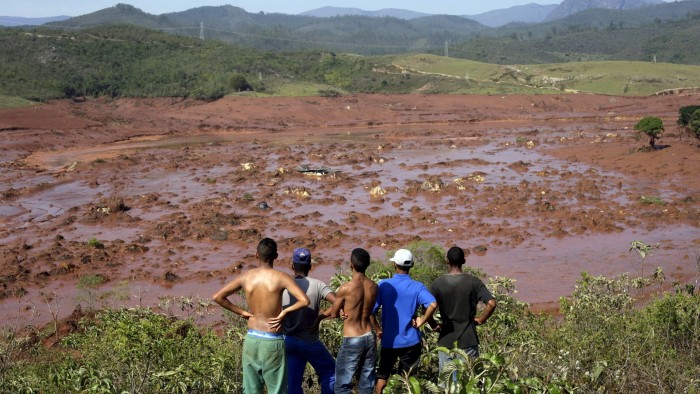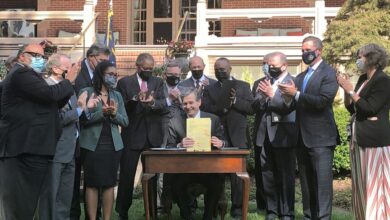The little-known law firm behind the biggest case in UK history

In his early days as a lawyer, Tom Goodhead learnt the trade through unglamorous personal injury cases such as medical negligence, car crashes and, in one instance, a person who fell in a pub called The Tumble Inn.
Today he is responsible for what is thought to be the biggest case in British legal history: a £36bn class action against Australia’s BHP over a mining disaster in Brazil.
Backed by big money investors, his firm Pogust Goodhead has brought a London lawsuit on behalf of nearly 640,000 victims of the 2015 Mariana dam collapse, which killed 19 people, displaced thousands and wrought extensive ecological harm.
A judgment is expected before summer, after the recent conclusion of a 12-week civil trial in the High Court.
“It’s probably the largest class action ever brought in the English courts,” said Goodhead. For the victims’ families it was about “holding the largest mining company in the world accountable”.
“We’ve got a huge amount riding on it,” he said.
That includes the reputation of his young litigation boutique, which is promised a bumper payday if it wins, but reported an operating loss of £52mn in its most recent accounts.
In an overdue 2022 financial statement published this week that showed £53mn in turnover, the firm’s auditors flagged a “material uncertainty” over whether it could continue as a going concern, due to its funding needs. Goodhead said the 2022 loss was “entirely unsurprising” because the firm “has grown in a way more akin to a Silicon Valley start-up than a law firm”, adding that it had the “unequivocal backing” of its lenders.

Pogust Goodhead, which specialises in consumer protection and environmental cases, has previously calculated the Mariana damages to be as much as £36bn, plus inflation and interest. Under a “no win, no fee” deal, it is charging 20 or 30 per cent to most claimants, who include individuals, businesses and municipalities. For clients from indigenous communities it is working pro bono.
It is a high-stakes case both for BHP, which co-owns the Samarco iron ore complex where the accident took place, and for the boutique law firm, which has been cast alternatively as crusader and colonialist sponger.
“This action in London is part of a movement to discredit the Brazilian justice system and threatens our jurisdictional sovereignty,” said Rafael Valim, a lawyer at Warde Advogados, who has represented the Brazilian mining lobby Ibram. “We stopped being a colony a long time ago.”
Alongside ongoing cases ranging from faulty medical implants to mis-sold car finance, Pogust Goodhead has found a niche taking complaints of corporate wrongdoing in far-flung jurisdictions to courts including in England, Germany and the Netherlands.
The rationale in the BHP case is that the often slow pace of Brazil’s courts risks delaying or denying justice. A judge in England allowed the case against the miner in part because BHP had a parent company in London at the time of the incident.

“A spate of recent jurisdiction decisions concerning group claims against multinationals whose parent company is based in London suggests this trend will continue,” said Ted Greeno, London co-managing partner of litigation powerhouse Quinn Emanuel Urquhart & Sullivan, which is not involved in the Mariana case.
“Law firms, big or small, can take advantage of such a shift with the right funding,” he added.
Goodhead set up the firm in Liverpool in 2018 with Harris Pogust, a US attorney whose jet-set life filled with mansions and yachts is well documented on Instagram. The outfit got its first major successes in a data breach case against British Airways and over the Volkswagen diesel emissions scandal.
The firm, which has about 120 lawyers, has created a £200mn bonus pool and pledged to pay junior lawyers up to £2mn each over three years, a model made possible by US hedge fund Gramercy.
The £450mn funding put up by Gramercy for the BHP case is the largest ever in litigation finance for a claimant law firm, according to Goodhead.

However, the high financial rewards come with high demands, according to former employees. One ex-Pogust lawyer said it was common to work well into the night, adding that the firm had a “toxic culture” and promoted “rivalries between colleagues”.
Another said they put in 17-hour days and burnt out. The speed with which the firm has grown also meant some people had been promoted for being nice to Goodhead rather than competent, the former employee said.
“Seventeen-hour days and working into the night regularly reflect the reality of litigating against the largest companies in the world,” said Goodhead.
He added: “I acknowledge that our hours are brutal, but the pressures associated with work of this nature are not for the faint-hearted . . . It is, however, laughable to say I promote people who are nice to me. I promote the brightest and the best who are all-in on winning. If that causes competition or rivalry, so be it.”

Goodhead took on the BHP case three years after the devastating rupture of a tailings dam, containing waste material, at Samarco’s mine near the town of Mariana. The resulting catastrophe ranked among Brazil’s worst-ever environmental disasters.
BHP and Brazilian miner Vale, which jointly control Samarco, argue the lawsuit is not in the interest of victims and is no longer necessary after they signed a new $23bn settlement with public authorities last year, taking their indemnity bill to about $30bn.
Goodhead countered that the new deal was inadequate, pointing out that BHP said only 40 per cent of the London claimants would be eligible for compensation.
“We started the case in 2018 because the companies were doing nothing,” he said. “My clients don’t trust a single word that they’ve said.”
The BHP case has given rise to a host of other suits for the law firm originating in Brazil.
Its caseload includes residents forced to abandon their homes in a sinking city that has been blamed on underground mining, and citrus growers who claim they were ripped off by an orange juice magnate.
But nothing compares to the costs or potential wins from the Mariana case, in which Pogust Goodhead’s legal bill is running north of £250mn.
A courtroom victory would vindicate Gramercy and another backer — São Paulo-based Prisma Capital — for putting up funds. Gramercy has insurance in place to protect its capital, according to Goodhead. Under the litigation funding model, those who front the costs receive a cut of any damages.
He has called the Gramercy investment “a capitalist solution to the negative externalities of capitalism”.

If BHP is found liable, the amount of any payout would be subject to another trial scheduled for October 2026 with claimants needing to prove losses. Vale has agreed to split any sums due.
The pushback in Brazil has not relented. Opponents have slammed advanced payments to city governments that signed up to the London claim as inappropriate, though Goodhead defended the move. The Brazilian supreme court ruled that municipalities could not use any money from last year’s settlement by BHP and Vale to pay law firm fees.
Goodhead describes a complaint to the Brazilian Bar Association about the firm as “malicious and unfounded”.
“It’s an ongoing complete campaign of lawfare where they’re just trying to discredit the case,” he said.
Pogust Goodhead axed about 160 jobs recently — about 20 per cent of its workforce, mainly business services staff — because of cases that had not yet settled, according to Goodhead. But with about 30 other litigations active, he said the Mariana ruling was not existential.
“Ultimately, if we were unsuccessful, it’s not going to end my firm,” said Goodhead. “In terms of reputation, in terms of our financial position, in terms of recruitment, in terms of confidence . . . it’s obviously very, very important”.
With assistance from Beatriz Langella in São Paulo
https://www.ft.com/__origami/service/image/v2/images/raw/https%3A%2F%2Fd1e00ek4ebabms.cloudfront.net%2Fproduction%2Fe0d631a5-59ea-4c21-a7ec-5b7d2a04c64d.jpg?source=next-article&fit=scale-down&quality=highest&width=700&dpr=1
2025-04-20 04:00:09





